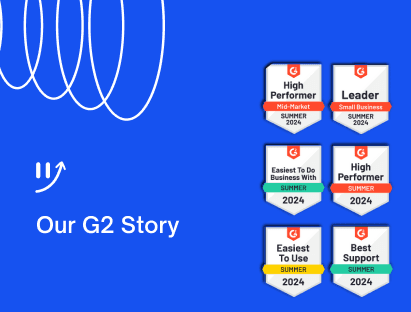What is MadKudu? The Lead Scoring Tool Explained
What is MadKudu? The Lead Scoring Tool Explained
What is MadKudu? The Lead Scoring Tool Explained
Understand the capabilities and limitations of MadKudu's predictive lead scoring platform.
Understand the capabilities and limitations of MadKudu's predictive lead scoring platform.
Understand the capabilities and limitations of MadKudu's predictive lead scoring platform.



If you’re on the hunt for a predictive lead-scoring tool, you’ve likely heard of MadKudu but might not know much about it. However, understanding its capabilities and limitations is crucial for making an informed decision.
What is MadKudu?
MadKudu founded in the mid-2010s, started as a lead scoring tool, using heuristics-dominated models to rank potential customers based on their likelihood to convert. Over time, it expanded to include features like behavioral segmentation and conversion probability analysis.
The founders, with backgrounds in data analytics and marketing, launched MadKudu to address the gaps they observed in lead scoring practices.
The lead scoring space has evolved a lot since the mid-2010s.
What MadKudu offers
Founded in the mid-2010s, MadKudu is becoming a key player in the lead-scoring space. Their product suite includes:
MadKudu Lead Scoring for Sales: Identify the prospects that are most likely to buy.
MadKudu Lead Scoring for Marketing: Add predictive intelligence and proactive prioritization to your marketing campaigns.
MadKudu Lead Scoring for RevOps: Get a 360-degree view of all your prospects.
In recent years, MadKudu has rushed to add new features in an attempt to bring it in line with customers’ expectations for a predictive lead-scoring tool.
Challenges with MadKudu: It has not evolved with the needs of modern businesses
It’s been over a decade since it entered the market. And according to some customers, it’s showing its age.
In reviews on one prominent site, customers point out several challenges with Alation:
MadKudu's lead scoring platform is hard to implement and integrate into your existing GTM stack. Far from being a DIY process, it requires the help of customer success managers who specialize in the product, an offering only available with the Enterprise plan of the product.
One unifying piece of feedback is the steep learning curve it is to implement the tool. Users remark how it takes significant education and bandwidth to get started with the tool. This further delays how quickly a team can get up and running with their predictive lead scoring.
According to several customers, it can be a little scary to deploy new models on their own. This adds to higher costs in support and implementation costs. All of these point to concerns about MadKudu’s true total cost of ownership.
Several customers noted that signals and scores aren't aggregated at a domain level and rather are available only at a user level leading to reduced efficiency. A lack of self-training models as data or business changes also seems to be a key concern.
Others pointed out the lack of behavioral data and signals surfaced. Customers also reported usability concerns around load time and clunky reporting.
Pricing is a concern, and it’s not just about base licensing costs. Given the nature of the solution as discussed above and how it affects the implementation, training, and maintenance costs – the total cost of ownership can pile up to be prohibitive.
These reviews and concerns paint a picture of a product that’s struggling to keep up with the vision of the modern predictive lead scoring tool.
Toplyne: The MadKudu Alternative
Modern predictive lead scoring tools need to provide more than just a mix of heuristic-dominated models as scoring algorithms. That’s not an easy feat. Still, these days, companies have come to expect their predictive lead scoring tool to support:
AI-lead scoring: Lead and account scoring based on an ensemble of tree-based models using product usage, firmographics, CRM, and billing data.
Economic Buyer Identification: Find the right users to reach at target accounts - economic buyers, most and last active users.
Multi-entity segmentation: Create custom audiences based on cascaded user, workspace, and account level product usage and firmographics.
Low go-live time: A set-up that doesn't take months long to implement and that doesn't eat up internal Engineering Blog and data science bandwidth.
Dedicated customer support is critical because predictive lead-scoring tools are only good if they see widespread adoption amongst potential users. Companies need reassurance that their lead scoring platform will do everything it can to ensure success.
If you’re on the hunt for a predictive lead-scoring tool, you’ve likely heard of MadKudu but might not know much about it. However, understanding its capabilities and limitations is crucial for making an informed decision.
What is MadKudu?
MadKudu founded in the mid-2010s, started as a lead scoring tool, using heuristics-dominated models to rank potential customers based on their likelihood to convert. Over time, it expanded to include features like behavioral segmentation and conversion probability analysis.
The founders, with backgrounds in data analytics and marketing, launched MadKudu to address the gaps they observed in lead scoring practices.
The lead scoring space has evolved a lot since the mid-2010s.
What MadKudu offers
Founded in the mid-2010s, MadKudu is becoming a key player in the lead-scoring space. Their product suite includes:
MadKudu Lead Scoring for Sales: Identify the prospects that are most likely to buy.
MadKudu Lead Scoring for Marketing: Add predictive intelligence and proactive prioritization to your marketing campaigns.
MadKudu Lead Scoring for RevOps: Get a 360-degree view of all your prospects.
In recent years, MadKudu has rushed to add new features in an attempt to bring it in line with customers’ expectations for a predictive lead-scoring tool.
Challenges with MadKudu: It has not evolved with the needs of modern businesses
It’s been over a decade since it entered the market. And according to some customers, it’s showing its age.
In reviews on one prominent site, customers point out several challenges with Alation:
MadKudu's lead scoring platform is hard to implement and integrate into your existing GTM stack. Far from being a DIY process, it requires the help of customer success managers who specialize in the product, an offering only available with the Enterprise plan of the product.
One unifying piece of feedback is the steep learning curve it is to implement the tool. Users remark how it takes significant education and bandwidth to get started with the tool. This further delays how quickly a team can get up and running with their predictive lead scoring.
According to several customers, it can be a little scary to deploy new models on their own. This adds to higher costs in support and implementation costs. All of these point to concerns about MadKudu’s true total cost of ownership.
Several customers noted that signals and scores aren't aggregated at a domain level and rather are available only at a user level leading to reduced efficiency. A lack of self-training models as data or business changes also seems to be a key concern.
Others pointed out the lack of behavioral data and signals surfaced. Customers also reported usability concerns around load time and clunky reporting.
Pricing is a concern, and it’s not just about base licensing costs. Given the nature of the solution as discussed above and how it affects the implementation, training, and maintenance costs – the total cost of ownership can pile up to be prohibitive.
These reviews and concerns paint a picture of a product that’s struggling to keep up with the vision of the modern predictive lead scoring tool.
Toplyne: The MadKudu Alternative
Modern predictive lead scoring tools need to provide more than just a mix of heuristic-dominated models as scoring algorithms. That’s not an easy feat. Still, these days, companies have come to expect their predictive lead scoring tool to support:
AI-lead scoring: Lead and account scoring based on an ensemble of tree-based models using product usage, firmographics, CRM, and billing data.
Economic Buyer Identification: Find the right users to reach at target accounts - economic buyers, most and last active users.
Multi-entity segmentation: Create custom audiences based on cascaded user, workspace, and account level product usage and firmographics.
Low go-live time: A set-up that doesn't take months long to implement and that doesn't eat up internal Engineering Blog and data science bandwidth.
Dedicated customer support is critical because predictive lead-scoring tools are only good if they see widespread adoption amongst potential users. Companies need reassurance that their lead scoring platform will do everything it can to ensure success.
Related Articles




Behavioral Retargeting: A Game-Changer in the Cookieless Era
Unlock the power of behavioral retargeting for the cookieless future! Learn how it personalizes ads & boosts conversions. #behavioralretargeting




All of Toplyne's 40+ Badges in the G2 Spring Reports
Our customers awarded us 40+ badges in G2's Summer Report 2024.




Unlocking the Full Potential of Google PMax Campaigns: Mastering Audience Selection to Double Your ROAS
Copyright © Toplyne Labs PTE Ltd. 2024
Copyright © Toplyne Labs PTE Ltd. 2024
Copyright © Toplyne Labs PTE Ltd. 2024
Copyright © Toplyne Labs PTE Ltd. 2024